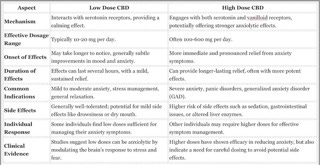Exploring the Benefits and Safety of Nano-particle CBD for Anxiety Treatment
Revolutionizing Anxiety Relief with Advanced CBD Technology, The Science is Catching up!
What is This All About?
Anxiety disorders are prevalent, affecting millions globally. Despite the availability of treatments, many individuals experience inadequate relief or undesirable side effects from conventional therapies. Approximately 31.1% of adults will face an anxiety disorder at some point, yet only 36.9% seek treatment. Cannabidiol (CBD), a non-psychoactive component of cannabis, has emerged as a promising alternative. This article combs through a recent study examining the effectiveness, safety, and pharmacokinetics of a nanodispersible CBD oral solution for treating mild to moderate anxiety.
Study Overview
Background and Relevance
Anxiety disorders are increasing, and existing treatments, such as benzodiazepines and certain antidepressants, often lead to addiction or adverse effects. CBD offers a potential alternative with fewer risks. This study aimed to evaluate the efficacy and safety of a nanodispersible CBD oral solution compared to a placebo. The study utilized standardized measures known for their sensitivity and reliability in detecting real differences in anxiety levels and related symptoms.
Gold Standard of Research
This study's design—randomized, double-blind, placebo-controlled—adheres to the highest standards of scientific research, minimizing bias and providing reliable evidence of CBD's efficacy and safety for anxiety treatment.
Study Design and Methodology
The phase III study, titled "Evaluation of the efficacy, safety, and pharmacokinetics of nanodispersible cannabidiol oral solution (150 mg/mL) versus placebo in mild to moderate anxiety subjects," was a randomized, double-blind, placebo-controlled trial, the gold standard in scientific research. In this design, 178 participants with mild to moderate anxiety were randomly assigned to receive either the nanodispersible CBD solution or a placebo for 15 weeks. Researchers used the Generalized Anxiety Disorder-7 (GAD-7) and the Hamilton Anxiety Rating Scale (HAM-A) to assess anxiety symptoms.
Key Findings and Takeaways
Efficacy of CBD Anxiety Treatment
1. Reduction in Anxiety Scores: Participants receiving the CBD solution showed significant improvements in anxiety scores. The mean GAD-7 score dropped from 11.8 at baseline to 4.8 at the end of treatment. Similarly, the mean HAM-A score decreased from 18.9 to 7.34.
2. Secondary Outcomes: Improvements were also noted in secondary outcomes, such as the Clinical Global Impression-Improvement (CGI-I), Clinical Global Impression-Severity (CGI-S), Patient Health Questionnaire-9 (PHQ-9), and Pittsburgh Sleep Quality Index (PSQI). This indicates that CBD not only helps with anxiety but also enhances symptoms of depression and sleep quality.
3. Safety and Tolerability: The CBD solution was well-tolerated with no serious side effects reported, highlighting its safety for anxiety treatment.
Mechanisms of Action
While the study did not cover much about the mechanisms, it did report that CBD interacts with various receptors and neurotransmitter systems involved in anxiety regulation, contributing to its minimal side effects. For more detailed information about the mechanism of action of CBD for anxiety, refer to the following studies:
1. Pertwee, R.G., 2008: This paper explores the diverse CB1 and CB2 receptor pharmacology of cannabinoids, including CBD.
2. Ibeas Bih, C., et al., 2015: This review discusses the multiple molecular targets of CBD, providing a comprehensive overview of its effects on neurological processes.
Hold Up: What is Nanodispersible?!
Nanodispersible technology breaks substances into extremely small particles, often less than 100 nanometers in size, enhancing solubility, absorption, and overall effectiveness. In this study, the nanodispersible CBD oral solution meant better solubility, enhanced absorption, and increased therapeutic effectiveness.
Applicability to Different Populations
While the study focused on individuals with mild to moderate anxiety, future research should include diverse populations with varying demographic characteristics and comorbid conditions to make the findings more universally applicable.
Summary Thoughts
This study provides robust evidence that nanodispersible CBD oral solution is effective and safe for treating mild to moderate anxiety disorders. The significant improvements in anxiety, depression, and sleep quality underscore CBD's therapeutic potential. These findings support further research into CBD for treating various psychiatric disorders, offering hope for a safer and more effective alternative to traditional anxiety medications.
For more information, access the full study here
Related media coverage is here.
More of my writing about cannabis & mental health: here
Hey:
… In addition to translations of the latest publications about cannabis, are there particular topics you want me to write about ?
Anxiety? Pain, Sleeplessness? Dementia? Cancer? Relationship Impacts? Sexuality?
How to talk to your doctor or your parents/kids/teachers?
For our valued paying subscribers, you not only get early access to these posts, but also below, you’ll find:
“Addressing Depression and Anxiety with Cannabis”
Referrals to related CaplanCannabis.com blogs on Anxiety and Depression
A concise table that outlines the biphasic response of CBD in treating anxiety, illustrating how both low and high doses can be effective for different individuals, with varying mechanisms, dosages, onset, duration, indications, side effects, and clinical evidence.
and…. also find these resources below the paywall.
Access to 150 free cannabis books
2TB of free cannabis publications,
the CED Clinic's comprehensive searchable database.
…a long sneak peak from pages 119-120 of The Cannabis Handbook about How Cannabis Truly Works for Mental Health Issues and How Cannabis Affects the Brain.
Keep reading with a 7-day free trial
Subscribe to Doctor Approved to keep reading this post and get 7 days of free access to the full post archives.










